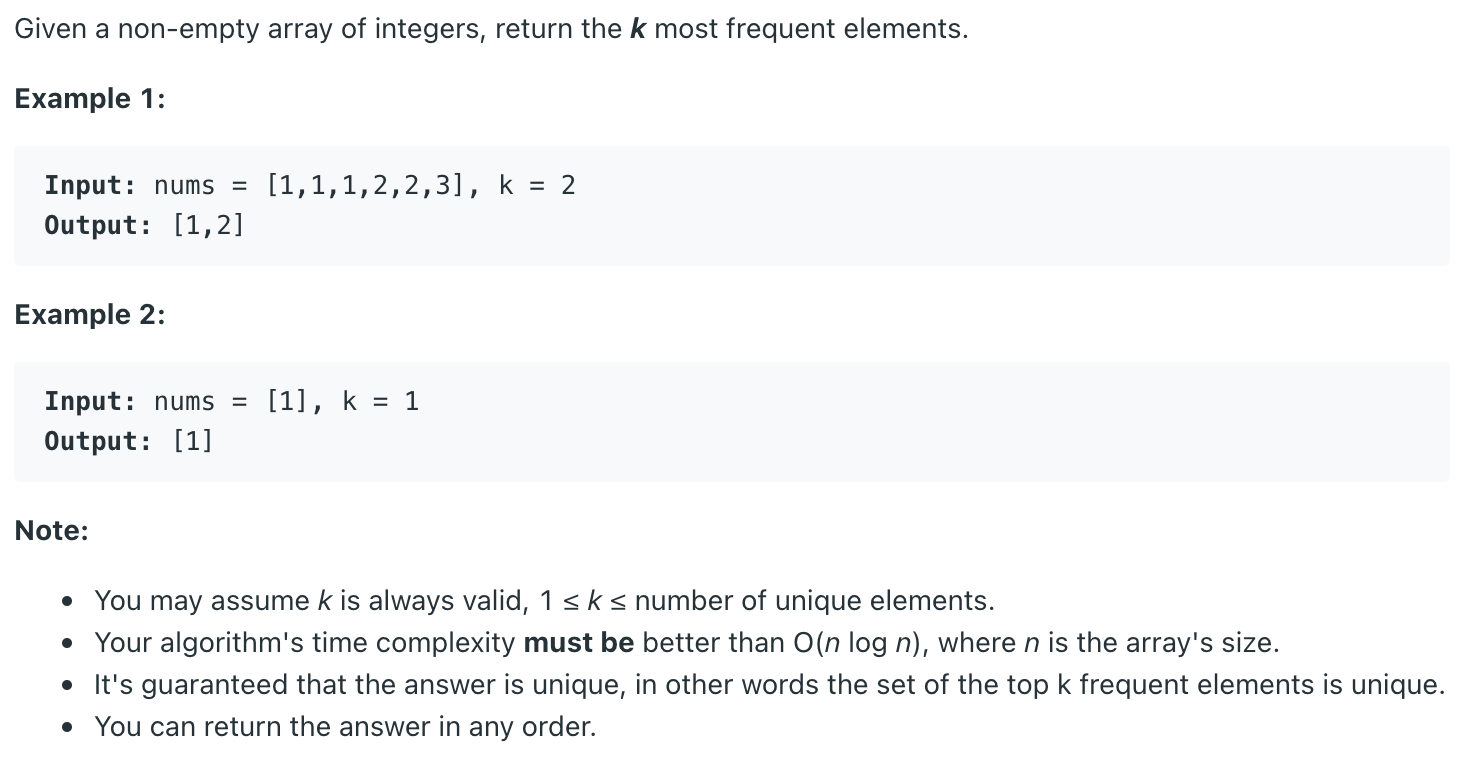Top K Frequent Elements
franklinqin0 HeapQuick Select

# Solution
Let be the length of the array.
# 1-liner Cheating
Use Counter's most_common:
from collections import Counter
def topKFrequent(self, nums: List[int], k: int) -> List[int]:
return [num for num, _ in Counter(nums).most_common(k)]
1
2
3
2
3
# Heap
Complexity
time: ( to build Counter and to push elts into the heap of size )
space: (hashmap w/ elements and heap w/ elements)
def topKFrequent(self, nums: List[int], k: int) -> List[int]:
if k == len(nums):
return nums
cnt = Counter(nums)
# following lines can be replaced by:
# return heapq.nlargest(k, cnt.keys(), key=cnt.get)
heap = []
for i in cnt.keys():
heappush(heap, (cnt[i], i))
if len(heap) > k:
heappop(heap)
return [v for _, v in heap]
1
2
3
4
5
6
7
8
9
10
11
12
13
2
3
4
5
6
7
8
9
10
11
12
13
# Quick Select
Complexity
time: (worst case: )
space:
from collections import Counter
from random import randint
def topKFrequent(self, nums: List[int], k: int) -> List[int]:
cnt = Counter(nums)
uniq = list(cnt.keys())
def partition(left, right) -> int:
# select a random pivot_idx
pivot_idx = randint(left, right)
pivot_frequency = cnt[uniq[pivot_idx]]
# 1. move pivot to end
uniq[pivot_idx], uniq[right] = uniq[right], uniq[pivot_idx]
# 2. move all less frequent elements to the left
i = left
for j in range(left, right):
if cnt[uniq[i]] < pivot_frequency:
uniq[i], uniq[j] = uniq[j], uniq[i]
i += 1
# 3. move pivot to its final place
uniq[right], uniq[i] = uniq[i], uniq[right]
return i
def quickSelect(left, right, k) -> None:
"""
Sort a list within left..right till kth less frequent element
takes its place.
"""
# base case: the list contains only one element
if left == right:
return
# find the pivot position in a sorted list
pivot_idx = partition(left, right)
# if the pivot is in its final sorted position
if k == pivot_idx:
return
# go left
elif k < pivot_idx:
quickSelect(left, pivot_idx - 1, k)
# go right
else:
quickSelect(pivot_idx+1, right, k)
n = len(uniq)
quickSelect(0, n-1, n-k)
# Return top k frequent elements
return uniq[n-k:]
1
2
3
4
5
6
7
8
9
10
11
12
13
14
15
16
17
18
19
20
21
22
23
24
25
26
27
28
29
30
31
32
33
34
35
36
37
38
39
40
41
42
43
44
45
46
47
48
49
50
51
2
3
4
5
6
7
8
9
10
11
12
13
14
15
16
17
18
19
20
21
22
23
24
25
26
27
28
29
30
31
32
33
34
35
36
37
38
39
40
41
42
43
44
45
46
47
48
49
50
51